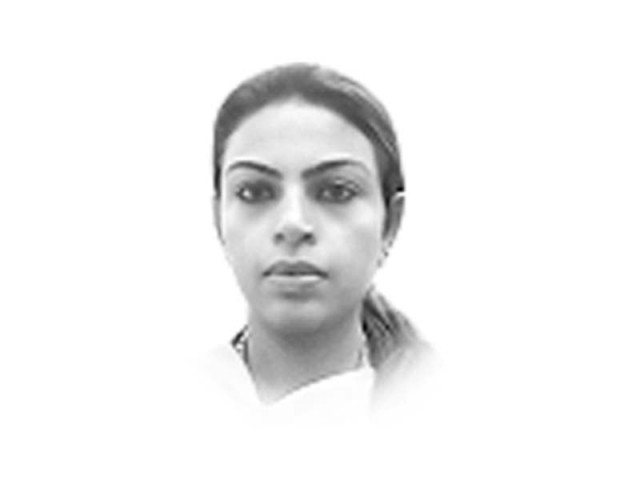Dictatorship in the garb of democracy
Democracy seems to hold little significance for a country that has seen more years of military rule or ‘soft coups’

The writer is an advocate, human rights defender and a
legal researcher

Pakistan is no exception. The concept of democracy, i.e., the rule of the people, by the people, for the people, has drawn much more than its fair share of sceptics in the country. According to a survey conducted by International Institute for Democracy and Electoral Assistance, 60 per cent of the respondents in Pakistan supported military rule till a few years ago. Democracy seems to hold little significance for a country that has seen more years of military rule or ‘soft coups’ than of true democracy. In the past, we have seen how any dissent under military dictatorships was silenced or censored by the so-called free media. Democratic processes have, time and again, been derailed in the name of national security and the glory of religion. Civil society activists, who play pivotal roles in opposing dictators, have been jailed or forced into self-exile.
The theme of this year’s International Day of Democracy was “Space for Civil Society”. According to a statement by the UN, “The day is a reminder to governments everywhere that the hallmark of successful and stable democracies is the presence of a strong and freely operating civil society in which government and civil society work together … and at the same time, civil society helps keep government accountable.” In his message to mark the day, Secretary General Ban Ki-moon stated that “civil society is the oxygen of democracy. Civil society acts as a catalyst for social progress and economic growth. It plays a critical role in keeping government accountable, and helps represent the diverse interests of the population, including its most vulnerable groups.”
Pakistan has had a chequered history marked by both democratic rule and dictatorships. Over the years, military intervention in civilian matters has formed the crux of much of the political turmoil suffered by the state. The democratic and parliamentarian form of governance, as envisaged by the founding father, failed soon after Pakistan’s inception, as political parties were weak and prone to corruption. Public confidence in the electorate and the electoral process has always been dismal. Pakistan was ranked 108th on the 2014 Democracy Index. According to the Economist Intelligence Unit, the ranking is based on the country’s electoral process and pluralism, functioning of government, political participation, political culture and civil liberties. It is pertinent to note that Pakistan has been mentioned under the category of hybrid regimes that are not considered fully functional democracies. Democracy, in its real essence, has never been allowed to trickle down to the general populace by elected dictators who have been primarily concerned with retaining their seats in the national and provincial assemblies and thus have not let people decide their future for themselves.
In its 68-year history, Pakistan has had four military dictators, with their rule spanning more than half the total years since independence, with three coup d’états, four unsuccessful coups, and numerous indirect interventions in governance. Martial law has been imposed across the country four times (in 1958, 1971, 1977 and 1999). Until 2013, Pakistan had not experienced even one democratic transfer of power from one democratically elected government that had completed its tenure, to another. All of its previous democratic transitions were aborted by military coups.
Pakistan’s judiciary has been complicit in the derailment of democracy. The Dosso case of 1959, which paved the way for military intervention in the name of national interest and state necessity, became a landmark judgment that tarnished the image of the judiciary as an independent institution and important pillar of state. In the past, the guardians of democracy themselves were not ready to protect the supposedly sacrosanct principles of freedom inherent in democracy. In such a scenario, there was no one to protect the man on the street, no one to ensure that his basic rights were not infringed upon and that his liberty was safeguarded.
It is appalling to note that many women in Pakistan are still denied the right to vote, making the whole electoral process a farce. In the 2013 election, women from certain areas of Gilgit-Baltistan and Khyber-Pakhtunkhwa were not allowed to vote by tribal elders, who considered it a disgrace for the family to allow women to step outside the house and vote. In several urban parts of the country as well, women were not allowed to cast votes through agreements among different political parties. Upon pressure from different rights groups, the state and the Election Commission of Pakistan took notice of these cases and announced re-elections, but this was too little too late.
Civil society, for its part, has always maintained its stance against authoritarian rule. Its unwavering support for the cause of democracy and independence of state institutions, particularly the judiciary, has played a pivotal role in ensuring that a semblance of democracy sustains in the country. Civil society, showing its mettle in the restoration of the judiciary, is a case in point. The state, for its part, has maintained hostility against activists critical of the government and its policies. The growing militarisation of state institutions and the retreat of civilian political leadership, combined with the rise of quasi-religious forces that are fiercely hostile to democracy, has created an environment in which taking up the issue of democratic governance is becoming increasingly hazardous. Yet, even in such hostile conditions, the civil and political activists of Pakistan have refused to budge and are continuing their struggle to protect the vulnerable and marginalised against an overbearing state.
Published in The Express Tribune, September 18th, 2015.
Like Opinion & Editorial on Facebook, follow @ETOpEd on Twitter to receive all updates on all our daily pieces.














COMMENTS
Comments are moderated and generally will be posted if they are on-topic and not abusive.
For more information, please see our Comments FAQ